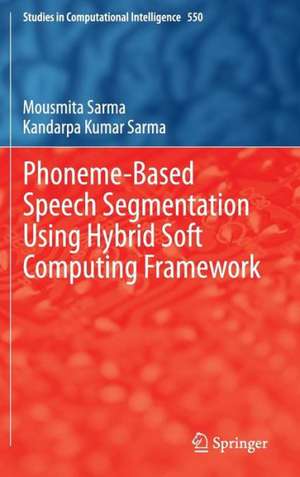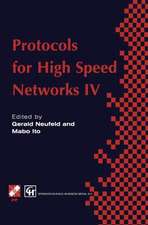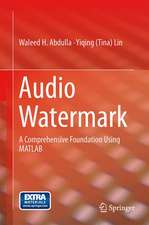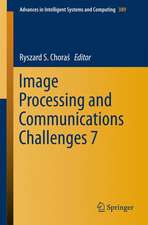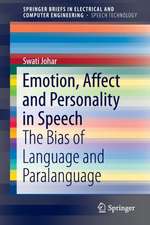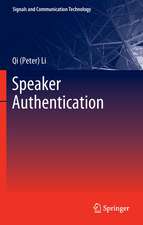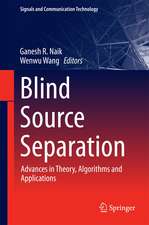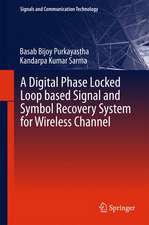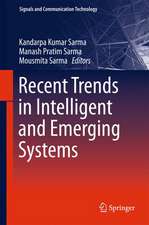Phoneme-Based Speech Segmentation using Hybrid Soft Computing Framework: Studies in Computational Intelligence, cartea 550
Autor Mousmita Sarma, Kandarpa Kumar Sarmaen Limba Engleză Hardback – 15 apr 2014
| Toate formatele și edițiile | Preț | Express |
|---|---|---|
| Paperback (1) | 641.34 lei 6-8 săpt. | |
| Springer India – 3 sep 2016 | 641.34 lei 6-8 săpt. | |
| Hardback (1) | 647.61 lei 6-8 săpt. | |
| Springer India – 15 apr 2014 | 647.61 lei 6-8 săpt. |
Din seria Studies in Computational Intelligence
- 50%
 Preț: 264.48 lei
Preț: 264.48 lei - 20%
 Preț: 1158.26 lei
Preț: 1158.26 lei - 20%
 Preț: 986.66 lei
Preț: 986.66 lei - 20%
 Preț: 1452.76 lei
Preț: 1452.76 lei - 20%
 Preț: 168.78 lei
Preț: 168.78 lei - 18%
 Preț: 1112.30 lei
Preț: 1112.30 lei - 20%
 Preț: 565.38 lei
Preț: 565.38 lei - 20%
 Preț: 649.28 lei
Preț: 649.28 lei - 20%
 Preț: 1047.73 lei
Preț: 1047.73 lei - 20%
 Preț: 1578.96 lei
Preț: 1578.96 lei - 20%
 Preț: 643.50 lei
Preț: 643.50 lei - 20%
 Preț: 657.49 lei
Preț: 657.49 lei - 20%
 Preț: 993.28 lei
Preț: 993.28 lei - 20%
 Preț: 990.80 lei
Preț: 990.80 lei - 20%
 Preț: 989.96 lei
Preț: 989.96 lei - 20%
 Preț: 1165.69 lei
Preț: 1165.69 lei - 20%
 Preț: 1444.52 lei
Preț: 1444.52 lei - 20%
 Preț: 1041.96 lei
Preț: 1041.96 lei - 20%
 Preț: 1047.73 lei
Preț: 1047.73 lei - 20%
 Preț: 1046.06 lei
Preț: 1046.06 lei - 18%
 Preț: 2500.50 lei
Preț: 2500.50 lei - 20%
 Preț: 989.13 lei
Preț: 989.13 lei - 20%
 Preț: 1165.69 lei
Preț: 1165.69 lei - 20%
 Preț: 1164.05 lei
Preț: 1164.05 lei - 20%
 Preț: 1042.79 lei
Preț: 1042.79 lei - 20%
 Preț: 1460.19 lei
Preț: 1460.19 lei - 18%
 Preț: 1403.52 lei
Preț: 1403.52 lei - 18%
 Preț: 1124.92 lei
Preț: 1124.92 lei - 20%
 Preț: 1039.47 lei
Preț: 1039.47 lei - 20%
 Preț: 1008.11 lei
Preț: 1008.11 lei - 20%
 Preț: 1045.25 lei
Preț: 1045.25 lei - 20%
 Preț: 1275.42 lei
Preț: 1275.42 lei - 20%
 Preț: 1040.32 lei
Preț: 1040.32 lei - 20%
 Preț: 988.32 lei
Preț: 988.32 lei - 20%
 Preț: 1169.79 lei
Preț: 1169.79 lei - 20%
 Preț: 1162.37 lei
Preț: 1162.37 lei - 20%
 Preț: 1059.26 lei
Preț: 1059.26 lei - 20%
 Preț: 1164.05 lei
Preț: 1164.05 lei - 20%
 Preț: 1166.52 lei
Preț: 1166.52 lei - 20%
 Preț: 1459.38 lei
Preț: 1459.38 lei - 18%
 Preț: 1005.74 lei
Preț: 1005.74 lei - 20%
 Preț: 997.38 lei
Preț: 997.38 lei - 20%
 Preț: 1055.94 lei
Preț: 1055.94 lei - 20%
 Preț: 1284.47 lei
Preț: 1284.47 lei - 20%
 Preț: 994.08 lei
Preț: 994.08 lei - 20%
 Preț: 1048.72 lei
Preț: 1048.72 lei - 20%
 Preț: 1066.02 lei
Preț: 1066.02 lei - 20%
 Preț: 943.78 lei
Preț: 943.78 lei - 20%
 Preț: 1173.10 lei
Preț: 1173.10 lei - 20%
 Preț: 1457.72 lei
Preț: 1457.72 lei
Preț: 647.61 lei
Preț vechi: 809.51 lei
-20% Nou
Puncte Express: 971
Preț estimativ în valută:
123.95€ • 127.74$ • 104.65£
123.95€ • 127.74$ • 104.65£
Carte tipărită la comandă
Livrare economică 04-18 martie
Preluare comenzi: 021 569.72.76
Specificații
ISBN-13: 9788132218616
ISBN-10: 8132218612
Pagini: 212
Ilustrații: XXI, 187 p. 62 illus. in color.
Dimensiuni: 155 x 235 x 17 mm
Greutate: 0.48 kg
Ediția:2014
Editura: Springer India
Colecția Springer
Seria Studies in Computational Intelligence
Locul publicării:New Delhi, India
ISBN-10: 8132218612
Pagini: 212
Ilustrații: XXI, 187 p. 62 illus. in color.
Dimensiuni: 155 x 235 x 17 mm
Greutate: 0.48 kg
Ediția:2014
Editura: Springer India
Colecția Springer
Seria Studies in Computational Intelligence
Locul publicării:New Delhi, India
Public țintă
ResearchCuprins
Part 1 (Background): Introduction.- Speech Processing Technology-Basic Consideration.- Fundamental Considerations of ANN.- Sounds of Assamese Language.- State of Research of Speech Recognition.- Part 2 (Design Aspects): Phoneme Segmentation Technique using Self Organizing Map (SOM).- Application of Proposed Phoneme Segmentation Technique in Spoken Word Recognition.- Application of Clustering Techniques to Generate A Priori Knowledge for Spoken Word Recognition.- Application of Proposed Phoneme Segmentation Technique in Speaker Identification.- Conclusion.
Notă biografică
Ms. Mousmita Sarma is currently working as Research Consultant at M/s. SpeecHWareNet Pvt. (I) Ltd., Technology Incubation Center, IIT Guwahati, Assam, India. She completed MSc in Electronics and Communication Technology from Gauhati University, India in 2010. She also completed M.Tech from the same institution in 2012 with specialization in Speech Processing and Recognition. She has co-authored one book and published several peer reviewed research papers in international conference proceedings and journals. She serves as reviewer to several journals and IEEE international and national conferences. Her areas of interest include Speech Recognition, soft-Computation and HCI Applications.
Dr. Kandarpa Kumar Sarma, currently Associate Professor in Department of Electronics and Communication Technology, Gauhati University, Guwahati, Assam, India, has over seventeen years of professional experience. He has covered all areas of UG/PG level electronics courses including soft computing, mobile communication, digital signal and image processing. He obtained M.Tech degree in Signal Processing from Indian Institute of Technology Guwahati in 2005 and subsequently completed PhD programme in the area of Soft-Computational Application in Mobile Communication. He has authored six books, several book chapters, around three hundred peer reviewed research papers in international conference proceedings and journals. His areas of interest are Soft-Computation and its Applications, Mobile Communication, Antenna Design, Speech Processing, Document Image Analysis and Signal Processing Applications in High Energy Physics, Neuro-computing and Computational Models for Social-Science Applications. He is senior member IEEE (USA), Fellow IETE (India), Member International Neural Network Society (INNS, USA), Life Member ISTE (India) and Life Member CSI (India). He serves as an Editor-in-Chief of International Journal of Intelligent System Design and Computing (IJISDC, UK), guesteditor of several international journals, reviewer of over thirty international journals and over hundred international conferences.
Dr. Kandarpa Kumar Sarma, currently Associate Professor in Department of Electronics and Communication Technology, Gauhati University, Guwahati, Assam, India, has over seventeen years of professional experience. He has covered all areas of UG/PG level electronics courses including soft computing, mobile communication, digital signal and image processing. He obtained M.Tech degree in Signal Processing from Indian Institute of Technology Guwahati in 2005 and subsequently completed PhD programme in the area of Soft-Computational Application in Mobile Communication. He has authored six books, several book chapters, around three hundred peer reviewed research papers in international conference proceedings and journals. His areas of interest are Soft-Computation and its Applications, Mobile Communication, Antenna Design, Speech Processing, Document Image Analysis and Signal Processing Applications in High Energy Physics, Neuro-computing and Computational Models for Social-Science Applications. He is senior member IEEE (USA), Fellow IETE (India), Member International Neural Network Society (INNS, USA), Life Member ISTE (India) and Life Member CSI (India). He serves as an Editor-in-Chief of International Journal of Intelligent System Design and Computing (IJISDC, UK), guesteditor of several international journals, reviewer of over thirty international journals and over hundred international conferences.
Textul de pe ultima copertă
The book discusses intelligent system design using soft computing and similar systems and their interdisciplinary applications. It also focuses on the recent trends to use soft computing as a versatile tool for designing a host of decision support systems.
Caracteristici
Provides lucid description of the theoretical concepts Discusses the use of soft computing and related tools to design intelligent systems for solving identified problems of speech processing Enables the learner to acquire range of knowledge of soft-computational approaches to speech recognition Includes supplementary material: sn.pub/extras
